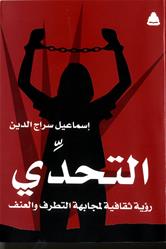Ismail Serageldin Offers a Cultural Vision to Fight Extremism in The Challenge
Posted on

The General Egyptian Book Organization (GEBO) has published the latest book authored by Dr. Ismail Serageldin, Director of the BA, in which he presents a cultural vision on how to fight extremism and violence.
The 314-page book comprises six sections explaining how extremist movements can be challenged intellectually and how to reclaim our cultural heritage from those who would usurp it and use it for their own political purposes.
The author confirms his confidence in the youth of Egypt, their creative abilities, sincere patriotism, and lofty ambitions through which a new generation of Egyptians will contribute in building Egypt’s future in the 21st century. The author also traces the emergence of youth movements during and following the Arab Spring revolutions in 2011. However, organized religious movements seized control of these revolutions, and internal conflicts in many societies led to disorder and even civil wars. All of this was to the result of the intellectual bankruptcy of many of the Arab regimes, the re-emergence of political Islam, the American invasion of Iraq in 2003, the continued Israeli occupation of the Palestinian territories, and the emergence of a powerful tyrannical bureaucracy, especially in Egypt.
Dr. Serageldin also presents an analysis of the cultural scene in Egypt and the Arab world today. While the socio-economic and political situation in the Arab world today could hardly be worse, there is, on the whole, a remarkable surge of cultural activity. Art, literature, cinema, television, and music are all flourishing. This movement has been further accelerated by a youthful generation of artists, especially after the Arab Spring. But these aspects are paralleled by a rise of intolerance by authoritarian states and an increase in fanaticism by a set of groups promoting extreme forms of political Islam.
In the end, Dr. Serageldin stresses the importance of addressing the phenomena of extremism and violence in our societies as cultural ones, and he emphasizes the necessity of understanding the mechanisms that underlie their growth and expansion. We must also, as mentioned by Wole Soyinka in the foreword at the forefront of the book, question ourselves about whether our artists have had the power to impact society as we have hoped.